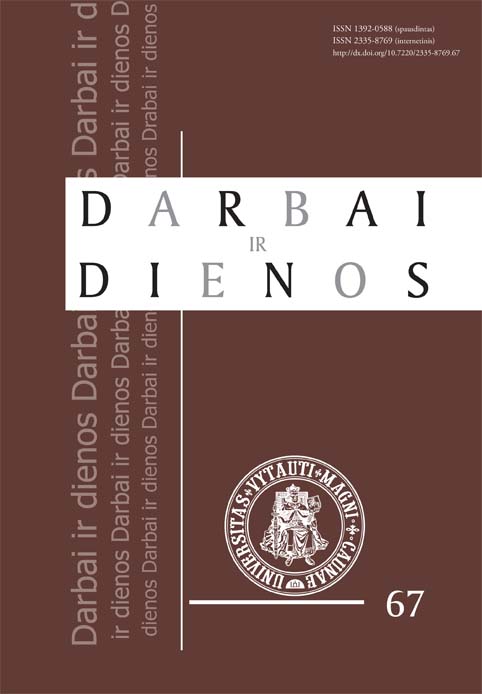The Position of Lithuania in the Japanese-German Relationship: Cooperation Between Kazys Škirpa and Hiroshi Oshima in 1935–1939
The Position of Lithuania in the Japanese-German Relationship: Cooperation Between Kazys Škirpa and Hiroshi Oshima in 1935–1939
Author(s): Simonas JazavitaSubject(s): History, Diplomatic history, International relations/trade, Military policy, Interwar Period (1920 - 1939)
Published by: Vytauto Didžiojo Universitetas
Keywords: Kazys Škirpa; Hiroshi Oshima; Chiune Sugihara; Lithuania’s – Japan’s relations; Germany’s – Japan’s relations; Lithuania’s – Germany’s relations; International relations in interwar period;
Summary/Abstract: The present article aims at discussing the foreign policy of the Republic of Lithuania in the 1930s, focusing on the development of relationship between two particularly powerful states of that time, Germany and Japan. The cooperation between the Lithuanian military attaché and later envoy to Germany Col. Kazys Škirpa and the Japanese military attaché and later Japanese ambassador to Germany Gen. Hiroshi Oshima is considered. Both men had quite a lot of similarities and they both finally turned out to be great enthusiasts of the pro-German geopolitical orientation. Unsurprisingly, they managed to coordinate their political positions despite the fact that they closely communicated personally. For such a small country as Lithuania this was especially important as the attempts of the German-Japanese alliance, which started with the Anti-Comintern Pact in 1936 and terminated in a fiasco after Germany had signed an agreement with the USSR in 1939, influenced the position of Lithuania. Japan was striving for a strong geopolitical counterbalance against the USSR and did not agree to sign a pact with Germany against Western states. Moreover, it did not develop anti-Semitism in its policy, which was typical of the Third Reich. When WWII started, Germany and Japan ended in different sides of barricades. Even though Lithuania was formally neutral, it expressed considerable benevolence to Poland that had lost and to its allies, France and Great Britain. Japan was disappointed with Germany and was striving to establish a counterbalance against the USSR; therefore, it was also interested in cooperation with this coalition. The best example of this is Chiune Sugihara’s, titled Righteous Among the Nations, activity in Kaunas. Attention should be paid to the fact that although Lithuanian institutions knew about the close relationship among the Japanese Vice-Consul, the Polish underground and Western allies, they created most favourable conditions for their successful activity in saving Polish citizens, mainly of Jewish nationality. All this activity terminated in the territory of Lithuania only when the country was occupied by the USSR army, which was the ally of Nazi Germany at the time.
Journal: Darbai ir dienos
- Issue Year: 2017
- Issue No: 67
- Page Range: 191-213
- Page Count: 23
- Language: English

